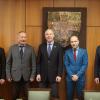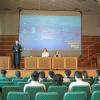Exemplary Innovation at the University of Pécs: New Hope for Epilepsy Patients
2019
Aug
08
A newly emerging form of treatment involves the use of a deep electrode test, first introduced in Hungary at the University of Pécs, promises new hope for at least a thousand patients suffering from an incurable form of epilepsy. Recent developments now pave a direction in determining the location of the veiled epileptic nodule. The Neurorehabilitation and Human-Machine Connection Research Center at the University of Pécs, recently hosted the grand opening of their sparkling new EEG facility, which meets the technical requirements of the “Lyon Agreement”, originally supported by the GINOP-2.3.3-15 contract.
In Hungary, roughly 100,000 individuals are suffering from epilepsy. Epilepsy is the result of a defective area in the brain, known as epileptic foci. This area triggers attacks by an increased discharge of nerve cells, causing a “system shock”. Many reasons can lead to the epilepsy-causing foci, some are due to genetical inherit, developmental disorder or major accidents. Enormous damages can happen to the patients, including immediate consequences that result in serious injuries and in extreme cases, cardiac arrest. Dr. Tóth, an epilepsy treatment specialist, stated that those who suffer from the disease encounter 25 times more in frequency of depression and suicide.
There is now hope for patients suffering from the untreatable form of epilepsy. Dr. Márton Tóth, brought home the commonly known stereotaxic EEG (SEEG) from Lyon, France, one of Europe's leading epileptic centers. The goal now is to ensure SEEG operations and tests are sustainable and to introduce them throughout Hungary. The cost of the first intervention was nearly eight million forints and financed by the PTE Chancellery. Preparations for further surgeries are already underway, yet adequate funding is essential in support of those patients waiting, and a detailed cost-effectiveness analysis has been carried out by the PTE's Health Technology Assessment Center.
Read their full article on this promising journey: http://aok.pte.hu/en/hirek/hir/11478
- Log in to post comments
University of Pécs | Chancellery | IT Directorate | Portal group - 2020.
















